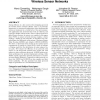Free Online Productivity Tools
i2Speak
i2Symbol
i2OCR
iTex2Img
iWeb2Print
iWeb2Shot
i2Type
iPdf2Split
iPdf2Merge
i2Bopomofo
i2Arabic
i2Style
i2Image
i2PDF
iLatex2Rtf
Sci2ools
126
click to vote
PERVASIVE
2008
Springer
2008
Springer
Localized power-aware routing in linear wireless sensor networks
Energy-efficency is a key concern when designing protocols for wireless sensor networks (WSN). This is of particular importance in commercial applications where demonstrable return on investment is a crucial factor. One such commercial application that motivated this work is telemetry and control for freight railroad trains. Since a railroad train has a global linear structure by nature, we consider in this paper linear WSNs as sensor networks having, roughly, a linear topology. Aiming at such networks, we introduce two routing schemes that efficiently utilize energy: Minimum Energy Relay Routing (MERR) and Adaptive MERR (AMERR). We derive a theoretical lower bound on the optimal power consumption of routing in a linear WSN, where we assume a Poisson model for the distribution of nodes along a linear path. We evaluate the efficiency of our protocols with respect to the theoretical optimal lower bound and with respect to other well-known protocols. AMERR achieves optimal performance fo...
Related Content
| Added | 14 Dec 2010 |
| Updated | 14 Dec 2010 |
| Type | Journal |
| Year | 2008 |
| Where | PERVASIVE |
| Authors | Marco Zimmerling, Waltenegus Dargie, Johnathan M. Reason |
Comments (0)

